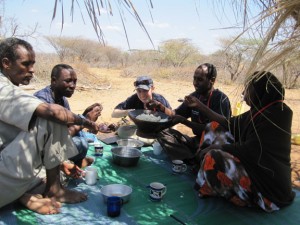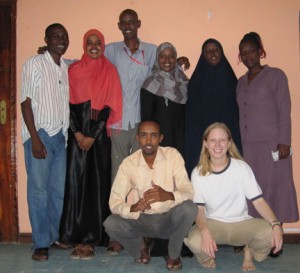By Barbara Mulligan
When Elizabeth Ponder ’04 arrived in Kenya’s North Eastern Province last May, she encountered a world far removed from the often-predictable laboratory setting she had occupied as a student at Lafayette and Stanford University.

Beth Ponder '04 (center) having lunch with friends in a village of the Garissa district in Kenya.
Ponder, who earned a Ph.D. in microbiology and immunology from Stanford’s School of Medicine in 2009, is now manager of scientific affairs in the San Francisco office of BIO Ventures for Global Health, a nonprofit organization that seeks to bring new biotechnology-based drugs, vaccines, and diagnostics to developing countries. She credits the three months she spent in Kenya, serving as a malaria-control intern for another nonprofit organization, MENTOR Initiative (MI), with expanding her vision from laboratory research to public health policy making.
Ponder was no stranger to malaria when she arrived in Kenya; she had researched the biological and drug-target functions of Plasmodium falciparum, the parasite that causes human malaria, as part of her Ph.D. research. But she wasn’t familiar with living in an area, including the districts of Garissa and Fafi, with few paved roads, scarce electricity and water, and rudimentary health care. Here, she met for the first time people for whom the disease is an actual threat.
“Although most of Kenya is developing quickly, this particular region is different,” she says, explaining that the North Eastern Province borders Somalia and is culturally and economically more similar to that war-torn nation than to the rest of Kenya. “Most of the people are nomadic herders of camels, goats, and cattle.”
Ponder says that while the region includes one of the world’s largest refugee camps, her task was to help conduct baseline surveys in health facilities and local communities outside the camp. The work, part of the MI’s four-year program to improve malaria diagnosis, treatment, and prevention, included introducing a rapid diagnostic test to be used by rural health workers.
“It’s really hard to survey a moving target,” she says. “The experience was eye-opening. It helped put my knowledge into perspective.”
She gained a deeper understanding of the strength of the people and the difficulties they

Elizabeth Ponder '04 (lower right) with the team she worked with as a malaria-control intern for the MENTOR Initiative in Kenya's North Eastern Province.
face. “Women in northeastern Kenya face some pretty tough conditions,” she says. “They can’t take a job without permission from their fathers and brothers. Many are from large families with multiple wives and many children.” She was impressed by the four local women she worked with. “They are intelligent and outgoing. They have so much potential.”
Ponder’s interest in parasite research began at Lafayette, when she participated in an ongoing project involving trematode parasites and snails with Bernard Fried, professor emeritus of biology, and Joseph Sherma, professor emeritus of chemistry. Her interest in disease research began in classes with William Bissell, associate professor of anthropology. In his medical anthropology class she learned how the interaction between people and diseases changes both the people and the diseases.
Ponder, a Goldwater Scholar who graduated with B.S. degrees in biochemistry and cultural biomedicine, says her current work involves helping to create partnerships between academic and nonprofit groups and the pharmaceutical and biotechnology industries. “We want to bring the best technologies and the best science together to create vaccines and diagnostics,” says Ponder, who is the scientific expert on a team with others who have more extensive experience in industry.
In a job that “satisfies both parts of my personality,” Ponder says she translates cutting-edge research to the people who can bring about lifesaving change. “I love science, and I love talking about science.”

